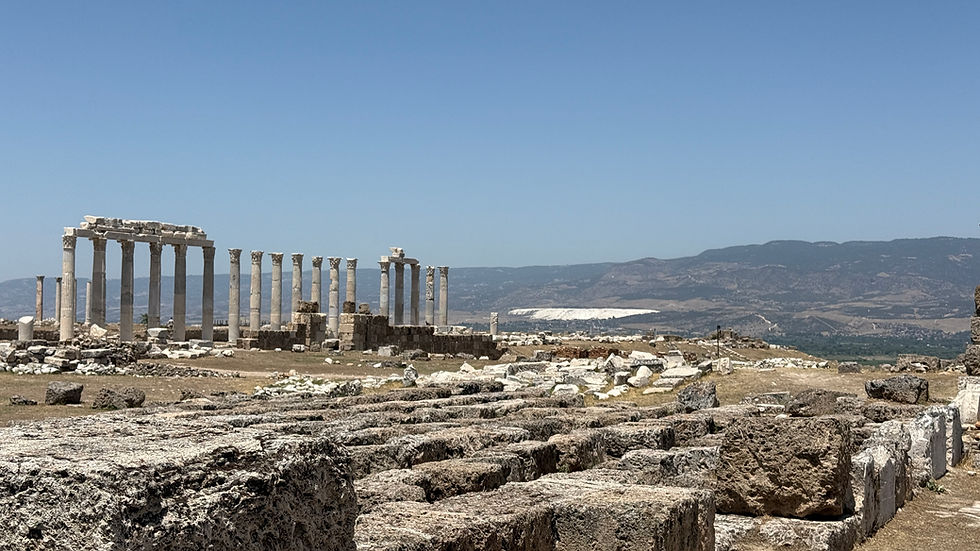THE ARRIVAL: A KING, A CROWD, AND THE ANCIENT LONGING FOR REDEMPTION
- Matt Rowell
- May 13, 2025
- 4 min read
Updated: May 18, 2025
As we enter Holy Week, we begin by commemorating Jesus’ entrance into Jerusalem. This event, which we call Palm Sunday, involves our Christ riding in on a donkey, surrounded by a parade of people shouting “Hosanna! Blessed is he who comes in the name of the Lord!” (Luke 19:38). It was a joyous occasion, though it caused a ruckus among the Jewish leaders. But even more, this moment is rooted expectation and prophetic fulfillment, as those who witnessed this sacred moment, as God’s redemptive plan was unfolding right before their eyes.
What did this moment mean for those who were present for this moment? And what does this mean for us today?
A Donkey, a Crowd, and a King
The story is found in all four Gospels (Matthew 21, Mark 11, Luke 19, and John 12), and is more broadly known as the “Triumphal Entry.” While it may seem like a spontaneous event, it is shrouded in significance and meaning. And Jesus entering Jerusalem, riding a donkey instead of a horse prepared for war, was intentional as it was a fulfillment of the prophetic words written by the prophet Zecheriah:
“Rejoice greatly, O daughter Zion! Shout aloud, O daughter Jerusalem! Lo, your king comes to you; triumphant and victorious is he, humble and riding on a donkey, on a colt, the foal of a donkey.” – Zecheriah 9:9
While this verse may seem simple, it reflects the very heartfelt desire of God’s people who desired a king that would bring about peace through humility and justice, rather than another military uprising or revolt. In contrast to prior events, where the Romans or Jews would ride into battle on stallions and chariots, Jesus is presenting himself as a king of peace, and not of war.
Ancient Visions and Expectations
In the first century the Jewish people lived under the occupation of the Roman Empire. Though Jerusalem was a large city, according to ancient standards, there were complex divisions among the Jews, especially among the various sects—Pharisees, Sadducees, Essenes, and Zealots—with each group possessing their own understanding and vision as to what God’s plan would hold for their future.
However, while many of these views were intensely debated, the Jews did essentially share a common hope: that the God of Israel would honor his covenant by fulfilling the words of his laws and prophets; he would send a Messiah that would bring about redemption to their oppression; that he would set the world at right through establishing again his kingdom in this world.
The expectation was for the Messiah to arrive in military prowess---ready to confront the oppressive powers that be. The Davidic Kingdom of Israel would be ushered in to inaugurate an era of justice and peace. And finally, a paradisiacal epoch would be established for future generations!
It seems God’s plan was much different; Jesus entered Jerusalem riding a donkey, not a decorated horse prepared for battle. He arrived in humility, not with military strength and skill. It seemed this moment was the antithesis of the expectation typically found among many of his people. Instead of overthrowing the head of imperial Rome, he chose to lay down his own life. And this would be done, not with brute force, but by offering his life on a cross.
What’s most interesting is that Jesus entered Jerusalem during Passover--a festival that commemorates the time of Israel’s deliverance from Egypt. It’s when God instructed Moses to have the Hebrews take the blood of a lamb and brush it over their doorposts, so that when death arrived, their lives would be spared (Exodus 12). It was a testament to God’s faithfulness to his people.
The time of Jesus’ entry was deliberately planned for this moment. The Passover feast lasted for several days, and within this festival there was a stirring of hope and expectancy of the arrival of the Messiah. However, with Jesus’ crucifixion looming, it was a symbolic confirmation to Christ’s mission to serve as the true Passover lamb and bring about a new hope to the world!
What Does It Mean for Us Today?
Even though our Christ made his entry into Jerusalem nearly 2,000 years ago, it is not only a past event, but it remains an open invitation:
To receive him in is provisions of redemption. Though it may not be with the waving of palm branches, awaiting his entry into Jerusalem on a donkey, he calls to surrender our lives to him; into a spiritual union that provides redemption, reconciliation, restoration, and ransom.
To embrace his way of peace and humility. As we live in a world driven by power, greed, and division, he calls us to follow him with humility, and take his yoke of meekness and obedience, in trusting his leading and statutes.
To take part in the glory of his kingdom. Jesus calls us to embrace and live out the values and righteousness of his kingdom, which is a call to mercy, grace, and love.
Palm Sunday is not only a commemoration, but also a challenge to the church: Will we welcome Jesus as he is and be transformed by his grace, or will we endeavor to make Christ into what we want him to be? Are we willing to allow his Spirit to mold our hearts and lives to be more like him, or will we try and make Christ look more like us?




Comments